Abashiri Prison Blu-ray Movie
HomeAbashiri Prison Blu-ray Movie 
網走番外地 / Abashiri bangaichi | Masters of CinemaEureka Entertainment | 1965 | 92 min | Not rated | No Release Date
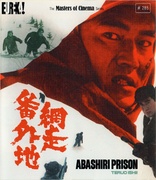
Price
Movie rating
6.6 | / 10 |
Blu-ray rating
| Users | 0.0 | |
| Reviewer | 4.0 | |
| Overall | 4.0 |
Overview
Abashiri Prison (1965)
Two prisoners are handcuffed together at Abashiri Prison in Hokkaido, a bitterly cold region. They are the chivalrous Shinichi Tachibana, who ran away from his poor farming family and entered the world of the yakuza, and is serving time in prison for an injury case, and Gonzo Gonda, a veteran with five previous convictions for robbery, rape, and attempted murder. Even in the common room, the two of them rebel against each other. Tachibana's sentence is almost up, but Gonda has plans to escape before that.
Starring: Ken Takakura, Kôji Nanbara, Tôru Abe, Kanjûrô Arashi, Kunie TanakaDirector: Teruo Ishii
| Foreign | Uncertain |
| Crime | Uncertain |
| Action | Uncertain |
Specifications
Video
Video codec: MPEG-4 AVC
Video resolution: 1080p
Aspect ratio: 2.39:1
Original aspect ratio: 2.35:1
Audio
Japanese: LPCM 2.0 Mono (48kHz, 24-bit)
Subtitles
English
Discs
Blu-ray Disc
Single disc (1 BD)
Playback
Region A (B, C untested)
Review
Rating summary
| Movie | 4.0 | |
| Video | 4.0 | |
| Audio | 3.5 | |
| Extras | 3.0 | |
| Overall | 4.0 |
Abashiri Prison Blu-ray Movie Review
Reviewed by Jeffrey Kauffman June 19, 2024 Note: This film is available on Blu-ray as part of Prison Walls: Abashiri Prison I-III.
There seems to be a general consensus based both upon some supplements included with this release as well as any number of other online data
sources
that The Defiant Ones* served as an inspiration for
at
least the first Abashiri Prison film. But as some of those same supplements make clear, that perceived cinematic "connection" really only
pertains to
the last third or so of the first film in a rather celebrated franchise, and in this case without some of the potent subtext of the well remembered
Stanley Kramer film
featuring Tony Curtis and Sidney Poitier. As tangential as The Defiant Ones may therefore be, evidently the idea
of two escaped prisoners shackled to each other and on the run provided some kind of interest for audiences, since this 1965 adaptation
of
a novel by Hajime Itō led to a glut of sequels (the first two of which are included in this set), while an earlier 1959 adaptation of the novel (which
I'm
assuming did not feature two escaped prisoners shackled to each other) seems to have been more or less buried by the vagaries of time
and tide. The supplements on this set get into the unexpected success of Abashiri Prison, a success which perhaps surprisingly was more
abundant with some of the sequels than with the first outing, and not only without that oft mentioned "sophomore slump", but an audience reaction
that was evidently more favorably inclined toward both the second and (perhaps especially) third films.
*Note: The link points to a UK Blu-ray release.
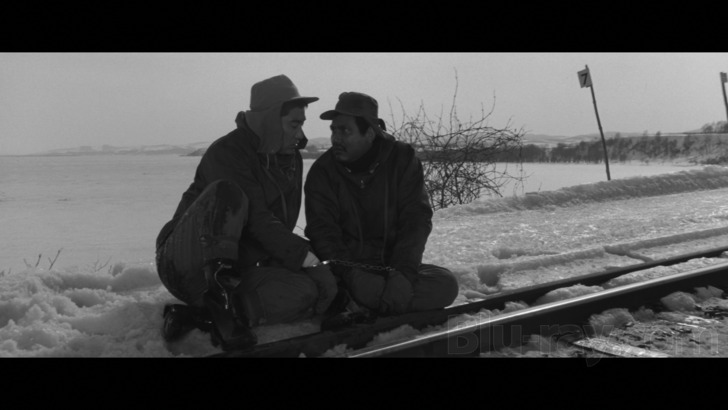
One of the interesting things about this "franchise starter" is how markedly different it is from the next two films. As is gotten into in some of the supplements, Toie really didn't have huge expectations for Abashiri Prison, and in fact initially released it as the veritable "B" side of a double feature. The unexpected success of the film, including the unlikely hit theme sung by star Ken Takakura, suddenly made a series seem like a no brainer, though in that regard, it's almost fascinating in a way to see how quickly characters who were developed with some skill and nuance in the first film are suddenly pretty much thrust into being "types" by the second film, something perhaps exacerbated by the fact that the second film in particular was written and shot insanely quickly to capitalize on the first film's success. There's also the obvious difference that the first film is in black and white, while the other two included in this set are in color, but there's also a distinct difference in tone, with the first film being more resolutely dramatic, and the second and third outings definitely more willing to engage in outright shtick at times.
This first film introduces its motley crew of prisoners literally from the get go, with Shinichi Tachibana (Ken Takakura) being a kind of unexpectedly urbane yakuza member, especially when compared to the much more hardscrabble Gonda (Kôji Nanbara). So you can probably already guess who gets handcuffed together during a frenetic prison escape, though it takes a while for this first film to "get there", which is why any ultimate reference on The Defiant Ones may not be completely accurate. In fact, it's arguable that the character back stories and almost comically polite interchanges the prisoners have about their histories is the more compelling element to this first film, rather than any perceived "action" aspect.
Abashiri Prison Blu-ray Movie, Video Quality 
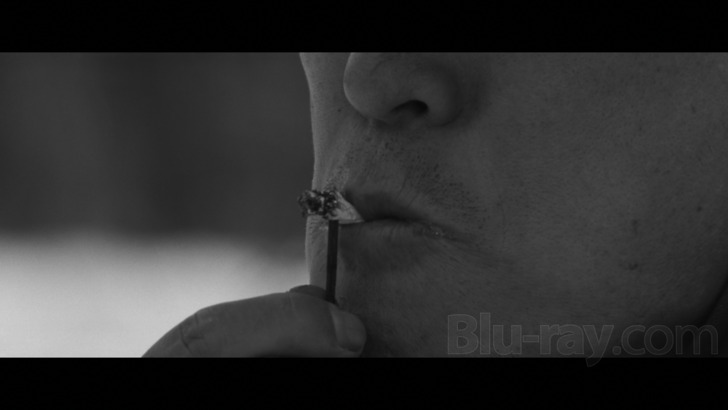
Abashiri Prison is presented on Blu-ray courtesy of Eureka! Entertainment's Masters of Cinema imprint with an AVC encoded 1080p transfer in 2.39:1. There's no technical information provided on this release that I could find in the insert booklet, other than standard verbiage alerting the still uneducated about why there are "black bars" and another warning about 4K UHD setups in particular which may have "motion smoothing" defaults. The back cover offers only a generic "1080p HD presentation of all three films from restorations of the original film elements supplied by Toei". Color me cynical, but I always tend to wonder exactly what "original film elements" may have been utilized, but one way or the other, I'd actually rate this sole black and white effort in the trilogy to be the most consistently pleasing viewing experience. Contrast is generally solid, and the wintry outdoor scenes offer a well modulated gray scale which helps to delineate shades of white in particular. Fine detail can be excellent in close-ups. There are some ebbs and flows to detail levels based largely on lighting conditions and occasionally on the differences between what I assume were more studio controlled settings and some of the location work. Grain may have been "managed" but it still noticeable and resolves naturally throughout.
Abashiri Prison Blu-ray Movie, Audio Quality 
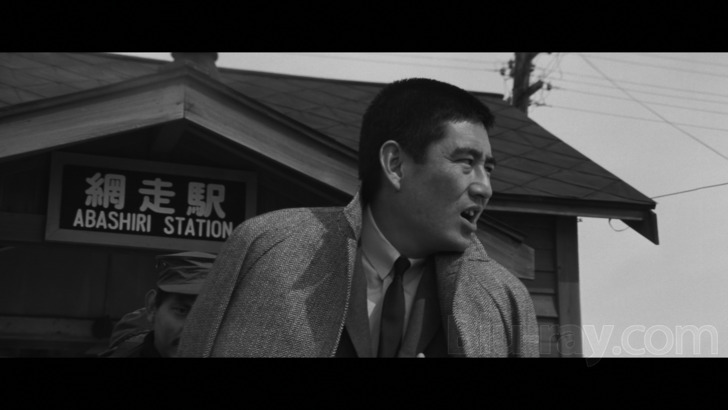
Abashiri Prison features an LPCM 2.0 Mono track in the original Japanese. The film's theme music became an overnight sensation in Japan, and for film fans, there may be yet another external reference to cinema history in that the opening (before Ken Takakura's vocals kick in) is kind of comically reminiscent of Anton Karas' inimitable theme for The Third Man. There's a slightly boxy sound that actually tends to be more prevalent in terms of sound effects and spoken material than music, though all dialogue is rendered cleanly. Optional English subtitles are available.
Abashiri Prison Blu-ray Movie, Special Features and Extras 
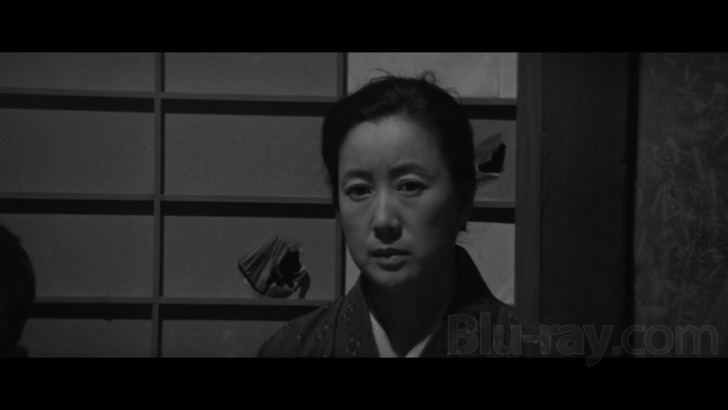
Eureka has packaged this set with the first two films on Disc One and the third film on Disc Two. The supplements, including the commentaries, can
be
far ranging (i.e., not necessarily limited solely to any given film), and so I'm including the complete array of supplements below.
Disc One ( Abashiri Prison and Abashiri Prison II)
- Abashiri Prison
- Audio Commentary by Tom Mes
- Original Theatrical Trailer (HD; 2:45)
- Abashiri Prison II
- Audio Commentary by Chris Poggiali
- Original Theatrical Trailer (HD; 2:50)
- Audio Commentary by Mike Leeder & Arne Venema
- Original Theatrical Trailer (HD; 2:21)
- Break Out: Jasper Sharp & Mark Schilling Discuss Abashiri Prison (HD; 29:26) is a really enjoyable conversation between these experts which covers the franchise as well as Ishii.
- Interview with Tony Rayns (HD; 30:41) offers more insight from the always informative Rayns, talking here about elements of the films included in this set, but also in a more wide ranging look at the series and in fact "series" as a concept in the Japanese film industry.
Abashiri Prison Blu-ray Movie, Overall Score and Recommendation 
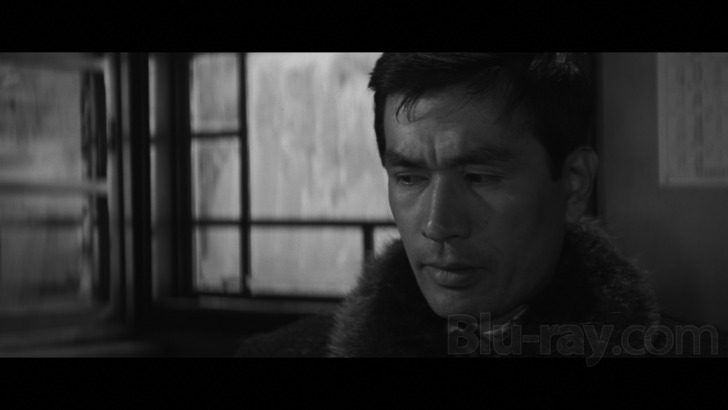
The first Abashiri Prison took Japan in general and Toei in particular completely by surprise, leading to one of the most insanely "populated" and quickly produced series of sequels in film history. Ishii fans in particular may find this outing and its two sequels in the "and now for something completely different" department, at least when compared to what are arguably some of Ishii's better known films in the West like Shogun's Joy of Torture or Orgies of Edo, but it's perhaps salient to note that Ishii is actually evidently much better remembered in Japan for the Abashiri series. Technical merits are generally solid and the supplements very worthwhile. Recommended.
Similar titles
Similar titles you might also like
(Still not reliable for this title)

Abashiri Prison: Saga of Homesickness
網走番外地 望郷篇 / Abashiri bangaichi: Bōkyō-hen | Masters of Cinema
1965

Another Abashiri Prison Story
続・網走番外地 / Zoku Abashiri bangaichi | Masters of Cinema
1965

Long Arm of the Law
省港旗兵 / Shěng gǎng qí bīng
1984

The Roundup: No Way Out 4K
Crime City 3 | Beomjoidosi 3 | Limited Collector's Edition
2023

Yakuza Wolf 2: Extend My Condolences
Ôkami yakuza: Tomurai ha ore ga dasu / 狼やくざ 葬いは俺が出す
1972

Yakuza Wolf: I Perform Murder
Ôkami yakuza: Koroshi wa ore ga yaru / 狼やくざ 殺しは俺がやる
1972

Vengeance of the Punks
La Venganza de los Punks
1991

Intrepidos Punks
1988

By a Man's Face Shall You Know Him
男の顔は履歴書
1966

Tokyo Knights
東京騎士隊 / Tokyo naito
1961

Smashing the 0-Line
密航0ライン / Mikkô zero rain
1960

An Eye for an Eye
Xuè xǐ hóng huā tíng / Wai ngoh duk juen / 血洗洪花亭 - Vinegar Syndrome Archive
1990

Iron Angels
Tian shi xing dong / 天使行動
1987

Doberman Cop
ドーベルマン刑事 / Doberuman deka
1977

Graveyard of Honor
Jingi no hakaba
1975

Massacre Gun
Minagoroshi no kenjû
1967

Shoot First, Die Later
Il poliziotto è marcio
1974

Crime Hunter: Bullets of Rage
クライムハンタ- 怒りの銃弾
1989

Female Prisoner Scorpion: Death Threat
女囚さそり 殺人予告 / Joshuu sasori: Satsujin yokoku
1991

Danger Point: The Road to Hell
Danger Point: 地獄への道
1991